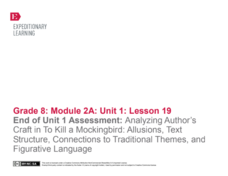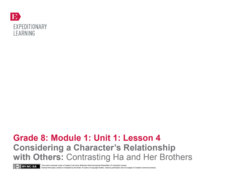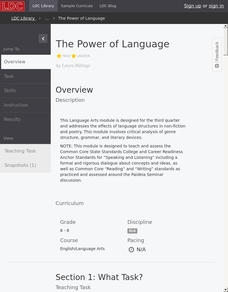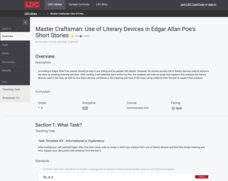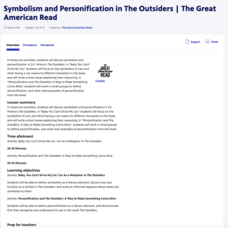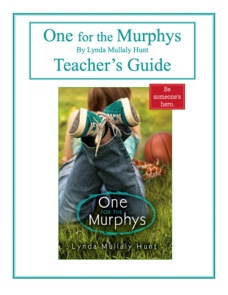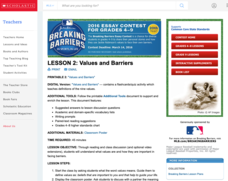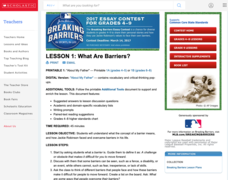Literacy Design Collaborative
Catching a Grenade: How Word Choice Impacts Meaning and Tone
Beyonce's "Halo" and Bruno Mars' "Grenade" provide eighth graders with an opportunity to consider how a writer's choice of words can create a very different tone even when the subject is the same. After a close reading of both lyrics,...
EngageNY
Comparing Meaning and Tone: The Fall of Saigon in Fiction and Informational Text
Who's that talking to? Readers listen to a reading of the "Forgotten Ship" transcript and answer questions focusing on word meaning and choice. They complete a chart to track the multiple narrators in the script. For homework, readers...
EngageNY
End of Unit Assessment: How Word Choice Contributes to Tone and Meaning
It's finally time for pupils to show what they know! Scholars finalize the unit with an end-of-unit assessment. They use the book Inside Out & Back Again and the "Forgotten Ship" transcript to examine word choice, tone, and...
EngageNY
Mid-Unit Assessment: Getting to Know a Character: What Details in the Text Help Us Understand Ha?
Take a walk with me. Scholars participate in a gallery walk of the anchor charts their groups created about Inside Out & Back Again in the previous lesson plan. Pupils take notes about Ha's character on sticky notes as they take the...
EngageNY
End of Unit 1 Assessment: Analyzing Author’s Craft in To Kill a Mockingbird: Allusions, Text Structure, Connections to Traditional Themes, and Figurative Language
Scholars demonstrate their learning with an end-of-unit assessment. They work independently to discuss the Golden Rule and its relationship in To Kill a Mockingbird.
EngageNY
Inferring About Character: Atticus (Chapter 5)
As part of their study of Harper Lee's To Kill a Mockingbird, class members participate in a silent discussion of the novel using a Chalk Talk chart. They then respond to the teacher's questions by writing their thoughts on the chart....
EngageNY
Launching To Kill A Mockingbird: Establishing Reading Routines (Chapter 1)
Scholars use a Story Impressions Note-catcher to capture their first impressions of words or phrases from To Kill a Mockingbird. They then listen to a reading of the first six pages of the novel before the teacher asks questions to check...
EngageNY
Considering a Character’s Relationship with Others: Contrasting Ha and Her Brothers
Who is Ha? Scholars look closely at the poem Papaya Tree and carefully examine the character Ha. Learners work in groups to create an anchor chart defining Ha's character. They also answer text-dependent questions to help with...
Literacy Design Collaborative
The Power of Language
There is power in words. Readers take a close look at three text to determine how language structures affect meaning, including include poems and recipes. Scholars analyze the language authors use by circling important words, underlining...
Literacy Design Collaborative
Master Craftsman: Use of Literary Devices in Edgar Allan Poe's Short Stories
Make the writing process a breeze for literary lovers. Scholars identify literary elements in Poe's The Tell-Tale Heart. They then choose their own short story from Edgar Allan Poe and repeat the processes independently. The final...
PBS
Symbolism and Personification in The Outsiders
A shirt can't really swallow you—right? Readers find examples of symbolism and personification in S.E. Hinton's The Outsiders with two straightforward lessons.
Simon & Schuster
Les Miserables Classroom Activities
Modern readers apply classic themes to Victor Hugo's masterpiece, Les Miserables. After they discuss tricky vocabulary and plot elements from the novel, class members compare Hugo's written work to a stage or film adaptation of the...
College Board
The Departure
Scholars learn about the Hero's Journey as they read Ray Bradbury's "The Drummer Boy of Shiloh." They analyze the story's structure and narrative techniques. Finally, they write summaries of the text's central idea and use their...
Literacy Design Collaborative
Analyzing Language through Dialogue and Internal Monologue in "The Scarlet Ibis"
James Hurst's short story "The Scarlet Ibis" provides eighth graders with an opportunity to sharpen their literary analysis skills. After a close reading of the text, class members highlight and annotate parts of the dialogue and...
Reed Novel Studies
Treasure Island: Novel Study
Pirates ahoy! Readers go on an adventure using a novel study for Treasure Island as they research and write about a modern-day pirate story. Additionally, scholars practice writing similes and alliteration before answering comprehension...
Reed Novel Studies
Tracker: Novel Study
Most deer are born with white spots that disappear as they grow. An interesting novel study for Gary Paulsen's Tracker shares more fascinating facts about the majestic animals. Readers also complete a vocabulary activity, solve anagrams,...
Reed Novel Studies
To Kill a Mockingbird: Novel Study
Edgar Rice Burroughs was an American fiction writer whose biggest claim to fame was the creation of Tarzan. Using the novel study for Harper Lee's beloved novel, To Kill a Mockingbird, pupils research and list facts about him or another...
Reed Novel Studies
Theodore Boone - Kid Lawyer: Novel Study
A child lawyer is exactly what people need ... not! With the novel study for John Grisham's Theodore Boone: Kid Lawyer, pupils use their imaginations to create their own examples of sarcasm. They also research a chosen famous lawyer and...
Joel Michel Studies
The Swiss Family Robinson: Novel Study
What items would most people want to have with them if they were stranded on a desert island? Using the novel study for The Swiss Family Robinson, scholars attempt to answer the question from their own perspectives. They also explore...
Reed Novel Studies
Summer of the Monkeys: Novel Study
There are more than 260 types of monkeys in the world. With the novel study for Wilson Rawls' Summer of the Monkeys, pupils research interesting facts about the banana-loving primates. They also practice exaggeration, write...
Reed Novel Studies
The Slave Dancer: Novel Study
What are the effects of a good literary cliffhanger? Using the novel study for Paula Fox's The Slave Dancer, pupils consider why the author chose to end the first chapter with suspense. They also answer text-based questions, practice new...
Penguin Books
One for the Murphys by Lynda Mullaly Hunt - Teacher's Guide
Children in foster care face a lot of uncertainty in their lives. A guide for the novel One for the Murphys introduces a main character, Carley, who is thrust into the foster care system. Chapter-by-chapter questions cover key...
Scholastic
Lesson 2: Values and Barriers
Scholars investigate and discuss the importance of values and how they can be used to break barriers. Small groups work collaboratively to examine the text and draw inferences to answer questions. A writing assignment challenges pupils...
Scholastic
Lesson 1: What Are Barriers?
Scholars discuss the concept of a barrier with a short passage on Jackie Robinson. The writing process begins with a paragraph and several other sentences about Robinson's unique traits that made breaking a barrier...






